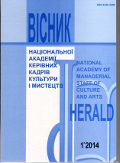ІНФОРМАЦІЙНА СФЕРА ЯК ЧИННИК ПОСТІНДУСТРІАЛЬНОГО СУСПІЛЬСТВА
DOI:
https://doi.org/10.32461/2226-3209.1.2014.137896Ключові слова:
культурологія, суспільство, інформаційний ресурс, комунікація, інформаційний простір, трансформація суспільстваАнотація
Інформаційні поля визначають структурність інформаційного простору. Рух інформації – інформаційний потік – є концентрованим накопичувачем інформації і джерелом діяльності каналів комунікації. Інформаційний простір у культурологічних концепціях сучасності не залишається осторонь трансформації комунікативної функційності, створюючи тим самим особливе середовище транскордоння, інтерактивності і мобільності, актуалізації і діяльності щодо реалізації сучасних культурологічних потоків. Накопичення обсягу інформаційного ресурсу сприяють змінам як самих напрямків культурологічних процесів, так і визначенню нових пріоритетів.
##submission.downloads##
Опубліковано
Номер
Розділ
Ліцензія
Автори, які публікуються у цьому журналі, погоджуються з наступними умовами:
1. Автори залишають за собою право на авторство своєї роботи та передають журналу право першої публікації цієї роботи на умовах ліцензії Creative Commons Attribution License International CC-BY, котра дозволяє іншим особам вільно розповсюджувати опубліковану роботу з обов'язковим посиланням на авторів оригінальної роботи та першу публікацію роботи у цьому журналі.
2. Автори мають право укладати самостійні додаткові угоди щодо неексклюзивного розповсюдження роботи у тому вигляді, в якому вона була опублікована цим журналом (наприклад, розміщувати роботу в електронному сховищі установи або публікувати у складі монографії), за умови збереження посилання на першу публікацію роботи у цьому журналі.
3.Політика журналу дозволяє і заохочує розміщення авторами в мережі Інтернет (наприклад, у сховищах установ або на особистих веб-сайтах) рукопису роботи, як до подання цього рукопису до редакції, так і під час його редакційного опрацювання, оскільки це сприяє виникненню продуктивної наукової дискусії та позитивно позначається на оперативності та динаміці цитування опублікованої роботи.

